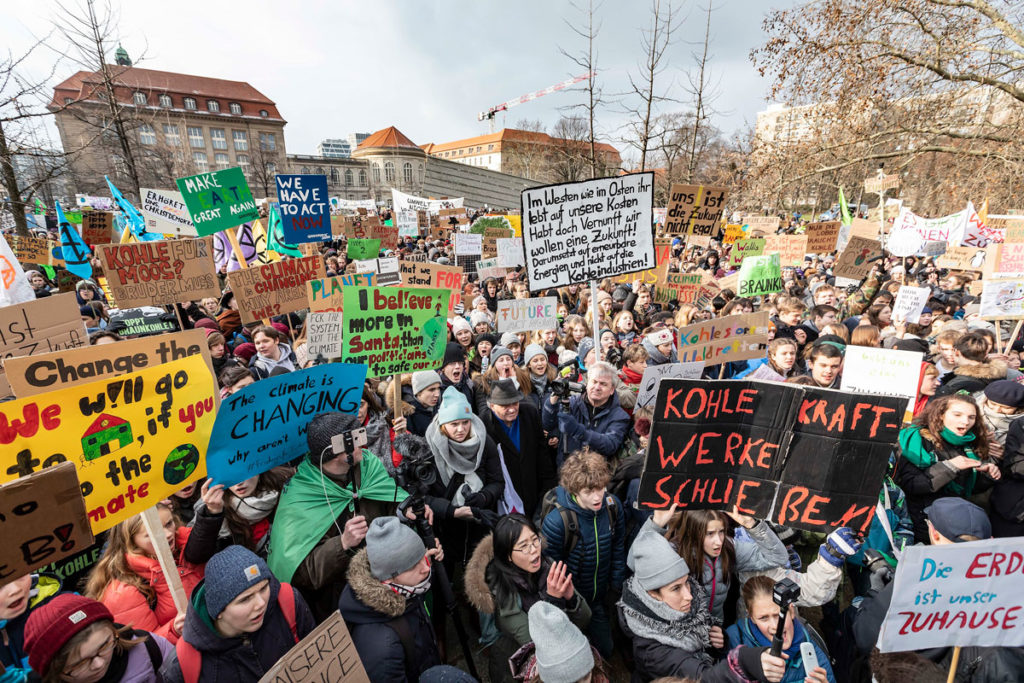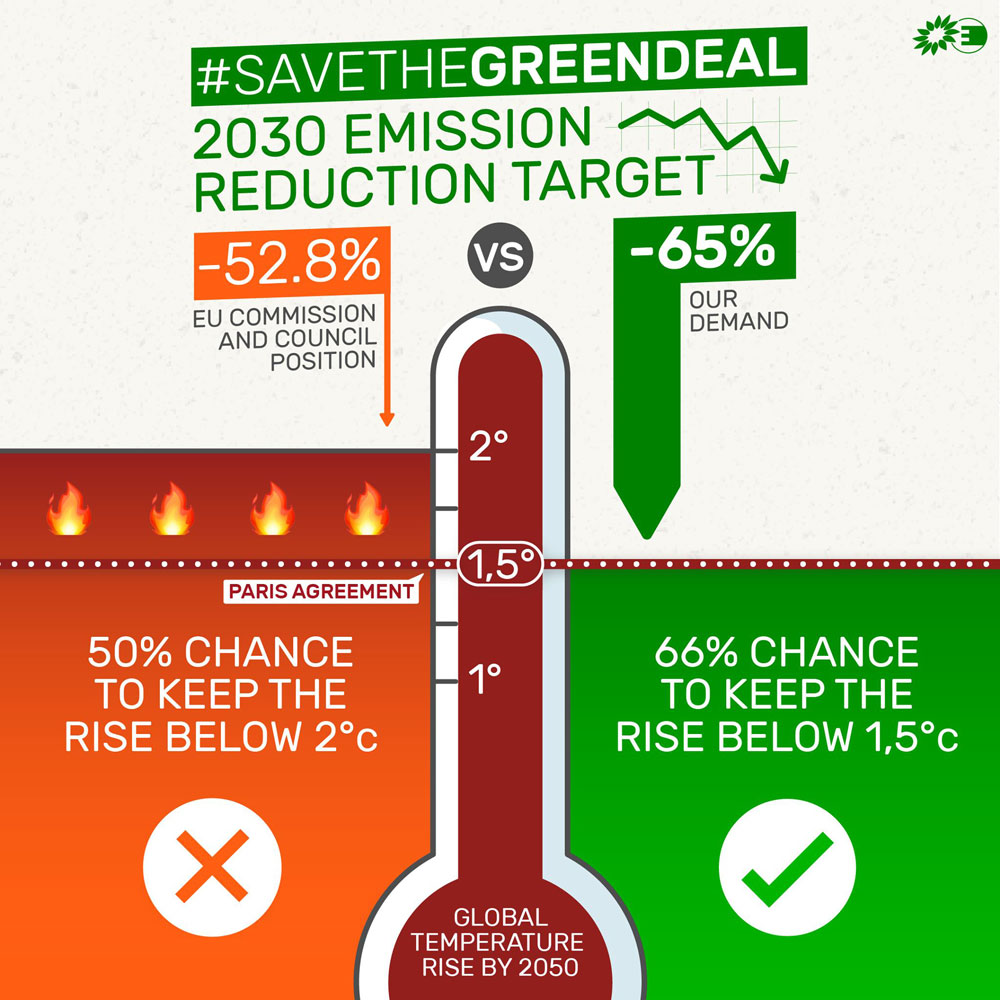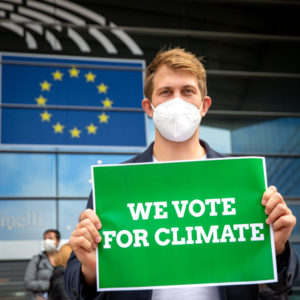23.06.2021
After long negotiations, the compromise climate target in the EU Climate Law amounts to a reduction of 52.8% in emissions which simply will not meet the goals of the Paris Climate Agreement. We need bold reduction targets to stop the climate crisis. There is no time to lose to slow down global warming significantly. We can’t endorse a climate law that breaks all our climate promises, writes Micha Bloss, Greens/EFA MEP and Greens/EFA negotiator on the European Climate Law.

The Greens/EFA Group has been leading the call for an EU-wide law for the climate. We wanted a law that would put into legislation the tools and the goals we need to implement the Paris Climate Agreement. Thousands of activists have been mobilised. Young people have been protesting on the streets. NGOs and climate scientists have issued urgent warnings about heat waves, droughts, floods, forest fires, water shortages and species loss. We have been the loudest voice in the European Parliament calling for a consistent reduction in emissions. We wanted a law to back us up.
After months of negotiations, I’m sad to say that the European Climate Law is simply not enough to limit global temperature rise to 2°C, let alone the 1.5°C that climate scientists say we need to achieve. Watered down by the fossil fuel lobby and EU governments, this climate law is not aligned with science or with the goals of the Paris Climate Agreement. What’s on the table now are half-measures and broken promises.

The EU should be leading the world in climate protection ahead of the most crucial climate summit of the decade: the COP26 in Glasgow.
In this podcast, scientists, politicians and activists tell us more about the new European Climate Law. Is Europe’s climate action enough to avoid climate catastrophe?
Begin at the beginning, please: what is the EU Climate Law?
In the spring of 2019, millions of Europeans heard Greta Thunberg’s call and marched on the streets demanding real climate action. In the European Parliamentary election, a Green wave swept across Europe. Decision-makers were forced to pull their heads out of the sand and propose a dedicated law to address the climate crisis.
Under pressure from the Greens/EFA and mass public outcry, a European Climate Law was put on the European Union’s agenda. The aim was to enshrine the 2050 climate-neutrality goals into European law. It would form a legal basis for climate action. To put it simply, once the law passes, the climate law requires all other EU laws to change and be in line with the targets. This means that, indirectly, it will force binding legal changes that all European countries will need to follow.
- September 2019: after a year of rising public protest, millions of people join a wave of global climate strikes
- November 2019: the European Parliament declares a climate emergency
- December 2019: the European Commission presents its European Green Deal, which includes plans for a EU Climate Law
- March 2020: the European Commission proposes a draft EU Climate Law.
- October 2020: the Greens/EFA persuade the European Parliament to adopt an ambitious position on the EU Climate Law. We secure support for a greenhouse gas budget, an independent climate council and a game-changing 60% emission reduction target.
- December 2020: European Heads of State settle on a lower net 55% emissions reduction target.
- May 2020: after months of negotiations, the European Parliament and the European Council reach an agreement
- June 2020: the European Parliament votes on the European Climate Law deal
- Today: Fighting the climate crisis is more urgent than ever before
What went wrong? Why won’t the EU Climate Law be enough to stop climate breakdown?
While we were successfully building support for more climate ambition inside the European Parliament, EU governments, and especially those with a strong fossil fuel lobby, were entering panic mode. They had already watered down elements of the Green New Deal just a few months earlier.
They used the same old arguments: “ambitious climate protection policies aren’t feasible” and “climate action could hurt the economy”. We’ve heard these arguments for decades, but the experts say they are wrong. A recent study proved that a green economy could create one million new jobs all over Europe. Ambitious emissions reduction targets actually boost economic growth because of investments in the energy sector.
Still, government ministers in the European Council started searching for excuses, not for solutions. They settled on a net 55% emissions reduction target. The word “net” opens a legal loophole that reduces this target even further when taking into account ‘carbon sinks’. In practice, this means that countries will only have to reach 52.8% of real reductions. The rest is carbon that is already stored in the ecosystem – in forests or wetlands, for example – without any positive effects on reducing carbon from the atmosphere.
A target of net -55% will lead to global warming way above 2°C by the year 2050. For a law that purports to be for climate action – and for us in the Greens/EFA Group – this is simply unacceptable. For comparison, a 65% emissions reduction target (like the one we have been arguing for) gives us a two thirds chance to keep global warming at 1.5°C in the same timeframe.

It’s much lower than the 60% target the European Parliament wanted, and it’s a far cry from fulfilling the Paris Climate Agreement promises. Even the German Constitutional court said that it was a constitutional duty to stick to the Paris Agreement temperature targets. Courts in the Netherlands, Belgium and France have followed suit.
Despite the European Parliament’s valiant attempts to find a compromise during the remaining negotiations, EU governments didn’t move an inch from the net -55% position. Eventually, with US President Joe Biden’s Climate Summit fast approaching, some negotiators wanted a quick deal rather than a good one. Very few elements of the European Parliament’s aspirational position made it into the final agreement on the EU Climate Law.
So, what do the Greens/EFA think about the final EU Climate Law deal?
Dressing this law up as a victory for the climate is disingenuous. This EU Climate Law is too weak to stop the climate crisis. It’s simply not enough. Pretending otherwise would be counter to our values, misleading to our electorate, unfair to all the climate activists who have thrown themselves into this fight and a betrayal to all future generations.
It’s not just us who disagree with it. The European Climate Law deal has been roundly criticised by climate experts and environmental groups, who have called it “rushed”, “a farce” and “not in line with the Paris Agreement’s ambition”. We’re serious when we say we have to start listening to climate scientists. We won’t ignore their voices.
We are still proud that the Greens/EFA were instrumental in getting the first-ever European climate law. The creation of an EU independent climate scientific board and the promise of an EU greenhouse gas budget for after 2030 were two of our key demands, and we welcome their adoption as part of the final package. It will serve to reinforce the role of science in future debates about EU climate action and targets.

Is climate activism finished now? What else can we do to fix the climate?
The EU Climate Law vote is a setback, but now is not the time to lose hope. What this shows us is that we can’t be complacent. We have to use elections to change the political landscape and put people in power who will make climate policy that is compatible with the Paris Agreement. Again and again, conservatives fail to take ambitious steps towards climate neutrality. We need to set them straight.
Meanwhile, other climate policies are being discussed under the umbrella of the European Green Deal. The “Fit for 2030” climate package, a set of climate policies that will be proposed by the European Commission in July, will still be an opportunity for Europe to become a climate champion. Policies like a combustion engine ban from 2030, the taxing of jet fuel and setting a higher carbon floor price in the EU’s Emission Trading System could really define the substance of the European Green Deal.
In November, Glasgow is hosting the most important climate summit of the decade: the COP26. We will be there, as always, fighting for a fully renewables-based economy by 2040, for keeping fossil fuels in the ground and for the complete transformation of our industrial, transport, and agricultural systems. We fight for social justice, for a green economy to provide quality jobs for workers and for a just transition that leaves no-one behind.
There is still time to save the European Green Deal.
We need your voice to fight for ambitious EU climate legislation!
Author

More information:
Gábor Vágó – Climate Campaigner
gabor.vago@ep.europa.eu


